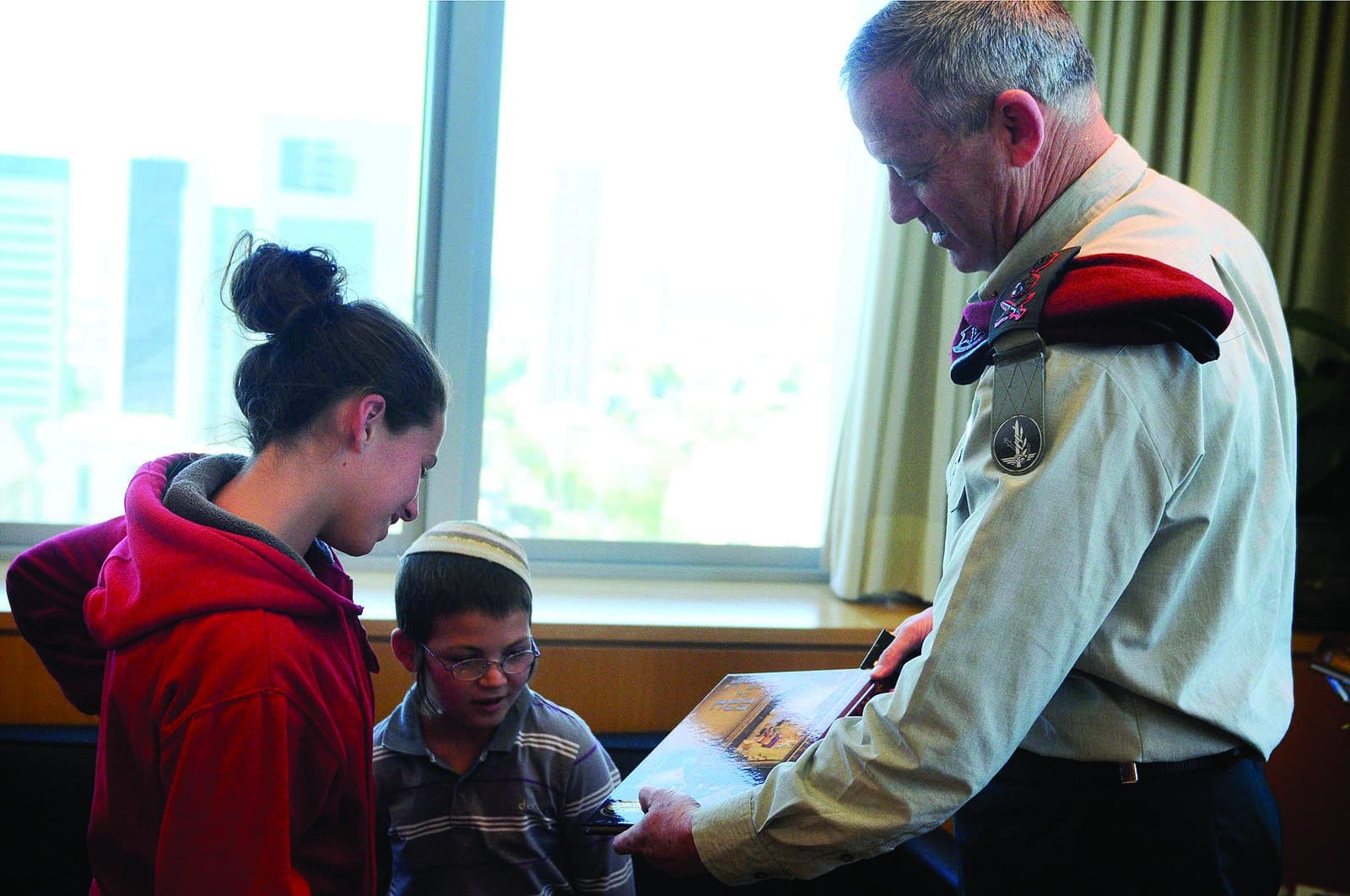 Then Chief of Staff, Lt. Gen. Benny Gantz, meets with the children of the Fogel family from Itamar whose parents and three of their siblings were murdered in a terror attack. Accompanied by extended family members, Tamar, Roei and Yishai arrived at the IDF headquarters in Tel Aviv. Photo by Israel Defense Forces.
Then Chief of Staff, Lt. Gen. Benny Gantz, meets with the children of the Fogel family from Itamar whose parents and three of their siblings were murdered in a terror attack. Accompanied by extended family members, Tamar, Roei and Yishai arrived at the IDF headquarters in Tel Aviv. Photo by Israel Defense Forces. During this pandemic, I’ve stopped reading insights from happiness gurus. Instead, I’ve turned toward ordinary people who have survived darkness and, yes, even unimaginable pain, as purveyors of how to be happy and, even more important, resilient.
Last week, I was deeply moved by news of the wedding of a young woman named Tamar Fogel in Israel. Her last name might sound familiar: Late one Friday evening in March 2011, two young Palestinian cousins, Hakim Mazen Awad and Amjad Mahmad Awad, broke into the home of Ruth and Ehud Fogel, and their six children, who had recently settled in the small town of Itamar. I cannot bring myself to tell readers exactly how these savages murdered three children—four-year-old Elad, eleven-year-old Yoad, a three-month old baby named Hadas—and their parents. Suffice it to say, to the horror of Jews worldwide, the attack became known as the “Itamar Massacre.”
Tamar, the Fogels’ then-twelve-year-old daughter, was at a youth meeting that night and returned home after midnight. One cannot even imagine what this little girl must have seen when she opened the door, but a neighbor, Rabbi Ya’akov Cohen, who later entered the home, said that Tamar’s two-year-old brother “was lying next to his bleeding parents, shaking them with his hands and trying to get them to wake up, while crying.”
If you can’t read beyond these words, I don’t blame you. I could barely get through researching the Itamar Massacre to write this column. I found myself in the same throes of shock, revulsion, pain, and weeping I first experienced when I heard about the murders ten years ago. I also found myself thinking about Tamar, just as I did in March 2011.
The three surviving Fogel children, Tamar, Ro’ie (then eight years old), and Yishai (then two), were put in the care of their grandparents. At the time, Tamar told her family, “I will be strong and succeed in overcoming this. I understand the task that stands before me, and I will be a mother to my siblings.”
As for the terrorists, they were each sentenced to five consecutive life sentences. In court, Amjad told reporters, “I don’t regret what I did and I would do it again. I’m proud of what I did and I’ll accept any punishment I get, even death, because I did it all for Palestine.”
In the past decade, the Fogel children were raised by their maternal grandparents, Rabbi Yehuda and Tali Ben Yishai. There have been happy occasions, including the boys’ bar mitzvahs. These days, Tamar, 22, is studying social work in Jerusalem. A few weeks ago, Chana Jenny Weisberg, a Baltimore native and mother of eight who now lives in Jerusalem and runs the popular blog, jewishmom.com, shared that Tamar recently got married (to a young man named Shir Weiss). According to Weisberg, Israeli press hasn’t reported about the wedding (only the engagement) and the family has asked that no photos be shared publicly.
I immediately thought about the Jewish belief that, during a chuppah ceremony, the souls of the bride and groom’s departed loved ones are present alongside them beneath the chuppah.
I immediately thought about the Jewish belief that, during a chuppah ceremony, the souls of the bride and groom’s departed loved ones are present alongside them beneath the chuppah. I thought about Tamar’s mother, father, two little brothers, and her baby sister, Hadas, who, had she survived, would have turned eleven this year.
In awe of Tamar, I wanted to embrace her and ask this extraordinary young woman a few questions: How do you continue to forge a path toward healing? What is it like to spend a day in your shoes? And what can I learn from you about resilience … and faith?
I once heard a rabbi remark that Jewish weddings are about love, but they’re also about something bigger: Jewish continuity. The thought of Tamar under the chuppah, surrounded by her remaining family, but also by the holy souls of her departed siblings, and the two people who loved her more than anyone in the world—her mother and father—is a source of hope, strength, and light to every Jew in the world, especially during this season of holy days known as z’man simchateinu (“the season of our happiness”). Mazal Tov, Tamar.
Tabby Refael is a Los Angeles-based writer, speaker, and civic action activist. Follow her on Twitter @RefaelTabby























 More news and opinions than at a Shabbat dinner, right in your inbox.
More news and opinions than at a Shabbat dinner, right in your inbox.